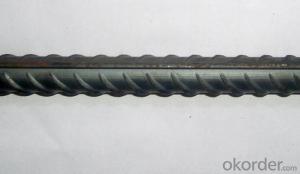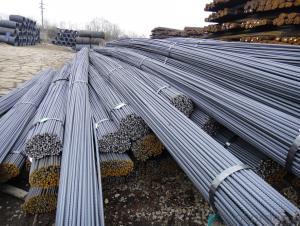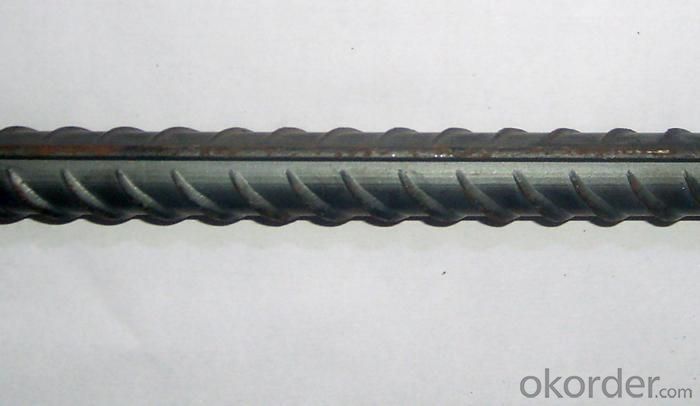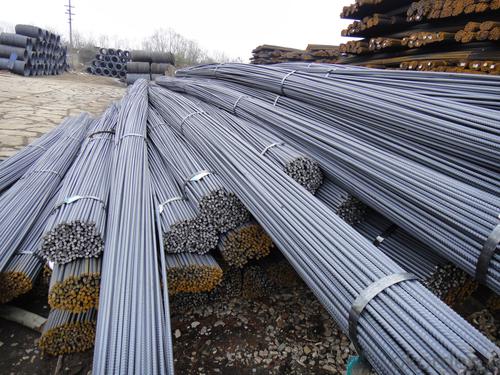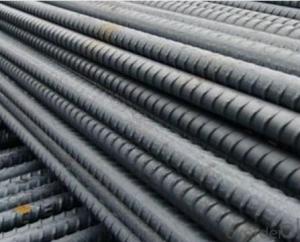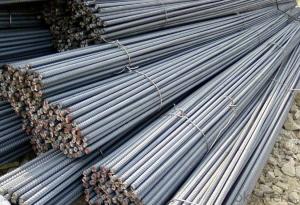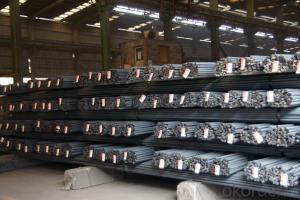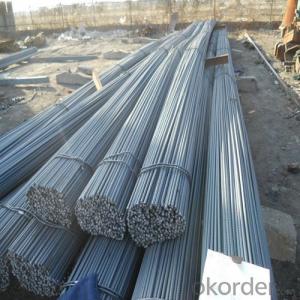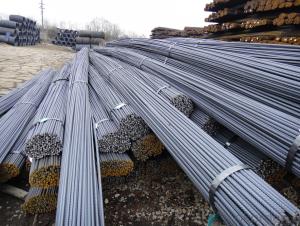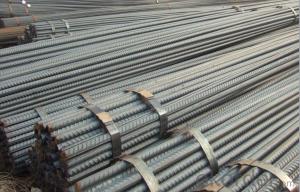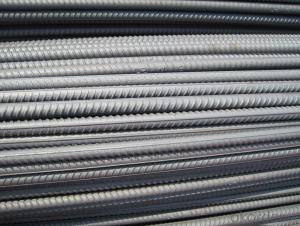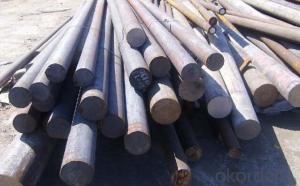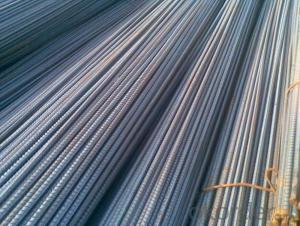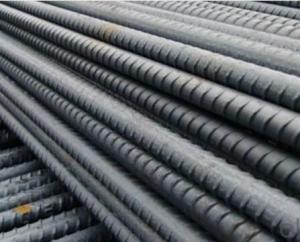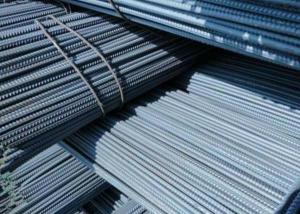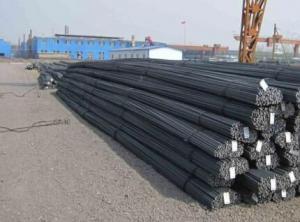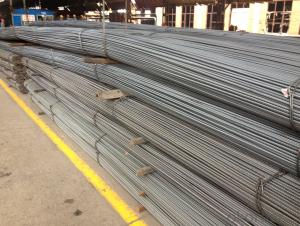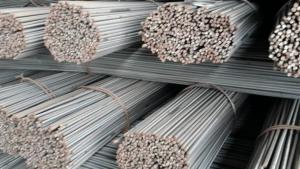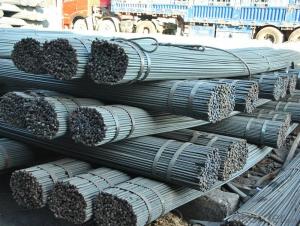Hot Rolled Carbon Steel Rebar 32mm with High Quality
- Loading Port:
- China Main Port
- Payment Terms:
- TT or LC
- Min Order Qty:
- 25 m.t.
- Supply Capability:
- 10000 m.t./month
OKorder Service Pledge
OKorder Financial Service
You Might Also Like
Product Description:
OKorder is offering Hot Rolled Carbon Steel Rebar 32mm with High Quality at great prices with worldwide shipping. Our supplier is a world-class manufacturer of steel, with our products utilized the world over. OKorder annually supplies products to European, North American and Asian markets. We provide quotations within 24 hours of receiving an inquiry and guarantee competitive prices.
Product Applications:
Hot Rolled Carbon Steel Rebar 32mm with High Quality is widely used in buildings, bridges, roads and other engineering construction. Big to highways, railways, bridges, culverts, tunnels, public facilities such as flood control, dam, small to housing construction, beam, column, wall and the foundation of the plate, deformed bar is an integral structure material. With the development of world economy and the vigorous development of infrastructure construction, real estate, the demand for deformed bar will be larger and larger..
Product Advantages:
OKorder's Hot Rolled Carbon Steel Rebar 32mm with High Quality are durable, strong.packed and suitable for construction
Main Product Features:
· Premium quality
· Prompt delivery & seaworthy packing (30 days after receiving deposit)
· Can be recycled and reused
· Mill test certification
· Professional Service
· Competitive pricing
Product Specifications:
Manufacture: Hot rolled
Grade: HRB335 HRB400 BS4449 Grade460 ASTM Grade40 Grade60
Certificates: ISO, SGS, BV, CIQ
Length:6m 8m 9m 12m
Packaging: Export packing, packed by coil
FAQ:
Q1: Why buy Materials & Equipment from OKorder.com?
A1: All products offered byOKorder.com are carefully selected from China's most reliable manufacturing enterprises. Through its ISO certifications, OKorder.com adheres to the highest standards and a commitment to supply chain safety and customer satisfaction.
Q2: How do we guarantee the quality of our products?
A2: We have established an advanced quality management system which conducts strict quality tests at every step, from raw materials to the final product. At the same time, we provide extensive follow-up service assurances as required.
Q3: How soon can we receive the product after purchase?
A3: Within three days of placing an order, we will begin production. The specific shipping date is dependent upon international and government factors, but is typically 7 to 10 workdays.
Q4: How many tons per bundle?
A4: Around 2-3tons
Q5: How to avoid the rust after deliver the goods to the loading port?
A5: We will keep the goods at the port covered with water-proof material
Q6: What is the chemical composition and physical properties of HRB400?
A6:
Grade | Technical data of the original chemical composition (%) | ||||||
C | Mn | Si | S | P | V | ||
HRB400 | ≤0.25 | ≤1.60 | ≤0.80 | ≤0.045 | ≤0.045 | 0.04-0.12 | |
Physical capability | |||||||
Yield Strength (N/cm²) | Tensile Strength (N/cm²) | Elongation (%) | |||||
≥400 | ≥570 | ≥14 | |||||
Images:
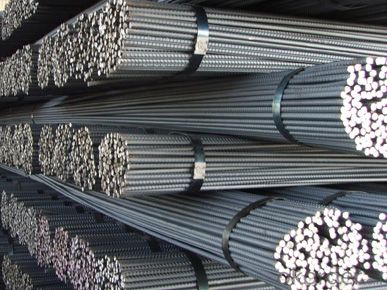
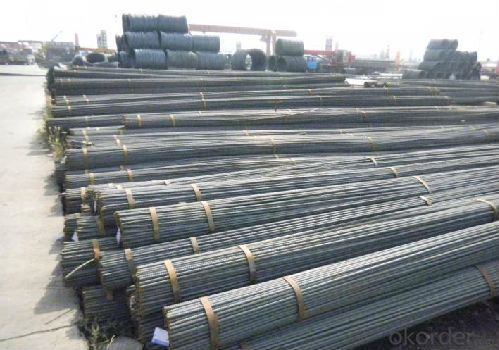
- Q: What are the guidelines for the proper lap splicing of steel rebars?
- Here are different grammar and expressions for the given guidelines: 1. Lap Length: To achieve the proper overlapping of rebars, a minimum distance, known as the lap length, must be maintained. This distance is determined based on factors such as bar diameter, strength, and the type of structure. Engineering codes and standards generally specify the required lap lengths. 2. Cleanliness: Before commencing lap splicing, it is crucial to ensure that the rebars are free from any dirt, rust, oil, or other contaminants. The presence of foreign materials on the rebar surface can impede the bond between the overlapping bars. 3. Alignment: The rebars intended for splicing must be accurately aligned and parallel to each other. Any misalignment can result in a weak splice, compromising the structural integrity of the construction. 4. Overlapping: The length of overlap between the rebars should be sufficient to transfer loads effectively and maintain reinforcement continuity. It is imperative to adhere to the specified lap length to achieve the required strength and performance of the reinforced concrete structure. 5. Splice Configuration: The choice of lap splice configuration depends on the structural requirements and the specific design of the project. Commonly used configurations include end-to-end splicing, staggered splicing, and mechanical splices. The selection of the appropriate configuration should comply with relevant codes and standards. 6. Splice Preparation: Thorough cleaning and preparation of the rebars at the lap splice area are necessary. This involves removing any loose rust or scale from the bar surface and ensuring adequate bond length between the bars. 7. Lap Splice Placement: The lap splice should be positioned at the designated location within the concrete member. It is crucial to avoid placing the splice too close to the edge of the concrete element, as this may reduce the cover depth and impact the structure's durability. 8. Splice Length Variations: In situations where achieving the required lap length is not feasible due to space limitations or other restrictions, alternative methods such as mechanical splices or welded splices can be considered. However, it is essential to consult the project engineer or designer to ensure compliance with the appropriate guidelines. 9. Quality Control: The lap splicing process should be subject to proper quality control measures. This includes monitoring the lap splice length, ensuring accurate alignment, and conducting periodic inspections to identify any defects or deficiencies. It is important to note that the above guidelines serve as general recommendations, and the specific requirements for lap splicing may vary depending on the design specifications, construction codes, and local regulations. Therefore, it is always advisable to consult the project engineer or designer for precise guidelines applicable to a particular project.
- Q: What is the role of steel rebars in preventing cracks in concrete?
- The role of steel rebars in preventing cracks in concrete is to provide reinforcement and strength to the concrete structure. By adding steel rebars to the concrete during construction, they help distribute the tensile forces and resist the formation of cracks. The rebars act as a framework within the concrete, absorbing and transferring the applied loads, thereby preventing the concrete from cracking under excessive stress. Additionally, steel rebars also enhance the overall durability, stability, and structural integrity of the concrete, ensuring its longevity and resistance to various external factors.
- Q: How do steel rebars affect the load-bearing capacity of concrete structures?
- Concrete structures greatly benefit from the use of steel rebars, as they play a crucial role in improving their load-bearing capacity. These rebars are embedded within the concrete to provide tensile strength, as concrete is known to be weak in tension. By reinforcing the concrete, rebars effectively distribute and bear the applied loads, ultimately enhancing the overall structural performance. The incorporation of steel rebars in concrete structures serves to resist cracking and prevent structural failure under various load conditions. When a load is exerted on a concrete structure, such as a beam or column, the rebars absorb the tensile forces generated by the load. This action safeguards the concrete from cracking and ensures the structure remains intact and stable. Furthermore, the utilization of rebars also enhances the flexural strength of concrete structures. Flexural strength refers to the capacity of a material to withstand bending forces. Through the reinforcement of concrete with rebars, the structure becomes more resistant to bending and can support heavier loads without experiencing excessive deflection or failure. Additionally, steel rebars play a pivotal role in enhancing the shear strength of concrete structures. Shear strength refers to the ability of a material to resist forces that cause one layer of the material to slide relative to another. By providing additional reinforcement, rebars strengthen the concrete against shear forces, thereby increasing the structure's resistance to lateral loads and preventing shear failure. In summary, steel rebars significantly bolster the load-bearing capacity of concrete structures by providing tensile, flexural, and shear strength. Their presence enables concrete structures to withstand higher loads, enhances their durability, and ensures their long-term structural integrity. Proper design and installation of rebars are imperative when constructing safe and structurally sound concrete buildings, bridges, and other infrastructure projects.
- Q: What are the safety precautions when working with steel rebars?
- When working with steel rebars, some important safety precautions to follow include wearing proper personal protective equipment such as gloves, safety glasses, and steel-toed boots to protect against potential injuries. It is crucial to handle rebars with care to avoid cuts or punctures, as the sharp edges can be hazardous. Additionally, workers should always be cautious of their surroundings and ensure a clear and organized work area to prevent tripping or falling accidents. Lastly, it is important to follow proper lifting techniques and use appropriate equipment to avoid strain or back injuries.
- Q: What are the guidelines for proper placement of steel rebars in concrete structures?
- To ensure the structural integrity and durability of concrete structures, it is crucial to place steel rebars correctly. Here are some guidelines to follow for proper rebar placement: 1. Consider the Design: Begin by referring to the structural drawings and specifications provided by the engineer. These documents will outline the required rebar sizes, spacing, and any specific details or arrangements needed for the project. 2. Determine Rebar Size and Spacing: The size and spacing of rebars should be based on the structural requirements and load-bearing capacity of the concrete structure. Adhere to the design specifications for the diameter and spacing of rebars to provide sufficient reinforcement. 3. Maintain Concrete Cover: The distance between the outer surface of the rebar and the edge of the concrete is called the concrete cover. This cover protects the rebars from corrosion and provides fire resistance. It is essential to maintain the specified concrete cover to ensure the rebars' longevity. 4. Consider Lap Length: When rebars need to be spliced or joined together, a lap length is specified. This length ensures enough overlap for stress transfer between rebars and prevents weak points in the structure. 5. Align and Position Rebars: Properly align and position rebars within the concrete formwork. Place them in the center of the concrete section to effectively resist tension and compression forces. Spacers or chairs can be used to maintain the desired rebar position during concrete pouring and setting. 6. Maintain Clearances and Edge Distance: Adequate clearances between rebars must be maintained to allow proper concrete flow during casting. Similarly, minimum edge distances should be maintained to prevent rebar corrosion and ensure proper concrete cover. 7. Tie and Fix Rebars: Securely tie and fix rebars at intersections to prevent displacement during concrete placement. Properly tying rebars using wire or approved connectors helps maintain their position and ensures the concrete's structural integrity. 8. Conduct Inspections and Quality Control: Regular inspections should be carried out during the concrete pouring process to verify correct rebar placement according to the design specifications. Address any deviations or discrepancies promptly to avoid compromising the structure's integrity. By following these guidelines, construction professionals can ensure the correct placement of steel rebars in concrete structures. This will result in safe and durable constructions that can withstand design loads and provide long-term structural stability.
- Q: Can steel rebars be used in parking structure construction?
- Yes, steel rebars can be used in parking structure construction. Steel rebars are commonly used in reinforced concrete structures, providing strength and durability to the construction. In parking structures, where heavy loads and traffic are expected, the use of steel rebars is critical to ensure the integrity and stability of the structure. These rebars are typically placed in the concrete slabs, walls, and columns of the parking structure, enhancing its load-bearing capacity and resistance to forces such as compression, tension, and bending. Additionally, steel rebars can also be used to reinforce the ramps, driveways, and other areas that require additional support in parking structures. Overall, the use of steel rebars is essential in parking structure construction to meet the required safety standards and ensure the longevity of the facility.
- Q: What is the relationship between the price and the hot coil steel prices?
- This is the current situation in the steel market. I'll make a fool of myself:I. energy conservation and emission reduction. The billet supply shortage in Hebei, the steel thread reduced supply, local area and even out of stock.Two, demand. Demand for long products now than flat material, by volume, resulting in coil ascribed weakness.Three, futures. Market confidence is not the same, the thread futures are now definitely heat up the volume of fast. Reflected to the spot, the thread rose fastFour, steel mills. Steel mills under the relationship between cost and supply, thread factory prices have been rising steadily; not hot.Five, inventory. Integrated one or two and four, thread destocking faster.Six, traders mentality. Why do you ask such a question, you are not what the firm confidence, also want to put prices up.
- Q: What are the factors to consider while designing with steel rebars?
- Designing with steel rebars requires careful consideration of several factors to ensure the structural integrity and performance of a construction project. These factors include load capacity, structural requirements, durability, construction methodology, building codes, and cost-effectiveness. Firstly, the anticipated load capacity of the structure must be taken into account. The size, spacing, and placement of rebars should be determined based on the expected loads that the structure will bear. Secondly, different structural elements have specific design requirements. The design of rebars should be tailored to meet the unique load distribution patterns of beams, columns, slabs, and foundations. Thirdly, the durability of steel rebars is crucial, as they are exposed to various environmental conditions. Protective measures, such as using epoxy-coated rebars or providing sufficient concrete cover, should be considered to prevent corrosion. Additionally, the construction methodology used for the project can influence the design of rebars. Factors such as formwork, construction joints, and accessibility during the placement of rebars need to be taken into account. Moreover, compliance with building codes and regulations is essential for safety and legality. Designers must adhere to specific requirements outlined in the codes, including minimum rebar sizes, spacing, and cover requirements. Lastly, cost-effectiveness should be considered without compromising the safety and performance of the structure. Optimizing the placement and arrangement of rebars can help minimize material and labor costs. In conclusion, by carefully evaluating these factors, designers can create robust, safe, and long-lasting structures when working with steel rebars.
- Q: How is steel rebar made?
- Steel rebar is made through a process called "hot rolling," where steel billets are heated and then passed through a series of rollers to shape them into long, straight bars. These bars are then cut into desired lengths and surface treated to enhance their strength and corrosion resistance.
- Q: How are steel rebars protected against chloride attack?
- Steel rebars are protected against chloride attack through various methods, including the use of corrosion-resistant coatings, such as epoxy or zinc, which act as a physical barrier. Additionally, concrete cover thickness is increased to provide a protective layer between the rebar and the chloride ions. Finally, admixtures, such as corrosion inhibitors, can be added to the concrete mix to reduce the penetration of chlorides and prevent corrosion of the rebars.
Send your message to us
Hot Rolled Carbon Steel Rebar 32mm with High Quality
- Loading Port:
- China Main Port
- Payment Terms:
- TT or LC
- Min Order Qty:
- 25 m.t.
- Supply Capability:
- 10000 m.t./month
OKorder Service Pledge
OKorder Financial Service
Similar products
Hot products
Hot Searches
Related keywords
